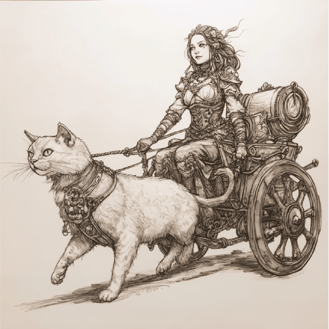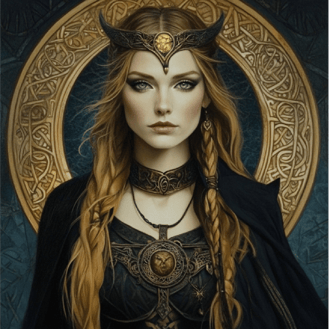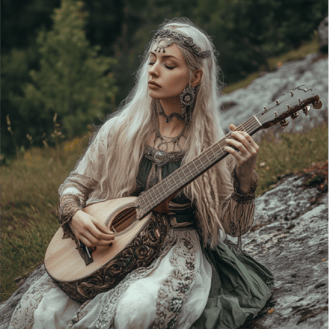Freya - The Goddess of Love, War, and Boundless Magic
Unveil the mystery and power of Freya, the enchanting Goddess of love, war, and boundless magic. As a fierce warrior and passionate protector, she embodies beauty, desire, and the untamed forces of the cosmos. Discover her sacred symbols, divine influence, and how to welcome her energy into your life.
GODDESSES
Goddess Hive
2/22/20255 min read
Welcome, Goddess Hive! Some links in this blog are affiliate links. Meaning, if you choose to shop through the links on this page, a small percentage of the sale will go to me at no additional cost to you. Thank you for your support. Goddess bless.
A Goddess of Passion and Power
In the twilight glow of the North, where the auroras dance across the sky and the winds whisper ancient secrets, there reigns a Goddess whose name carries the essence of love, war, and magic—Freya. She is the golden-haired Vanir deity, a being of unfathomable beauty and power, a force that ignites passion and fear in equal measure. Her chariot, drawn by mighty cats, glides across the heavens, and her cloak of falcon feathers grants her the freedom of the skies. Freya is not merely a Goddess; she is an energy, a calling, a presence that still lingers in the hearts of those who seek her wisdom.
The Origins and Role of Freya
Freya hails from the Vanir, an ancient race of Norse deities associated with nature, fertility, and prosperity. She was sent as a peace envoy to the Aesir, the warrior Gods of Asgard, after a brutal war between the two divine clans. Upon her arrival, Freya became one of the most revered Goddesses in Norse mythology. She played a vital role in human development and existence, embodying love, sensuality, war, and the mysteries of magic. She is the patron of the Seiðr, an ancient form of Norse sorcery, and it is said she taught Odin himself the secrets of fate-weaving.
Who Is Freya? Her Followers and Sacred Artifacts
Freya is the Norse Goddess of love, fertility, beauty, war, and death. She presides over Fólkvangr, a realm where half of the warriors slain in battle find their rest, while the other half are taken to Odin’s Valhalla. Her duality—offering both love and death—makes her one of the most complex deities of Norse mythology.
Her followers have ranged from Viking warriors who sought her favor in battle to those who revered her as a protector of fertility and prosperity. Even today, many modern pagans, witches, and followers of Heathenry honor Freya through rituals, spellwork, and devotion.
Artifacts associated with Freya include Brísingamen, a legendary necklace said to have been forged by dwarves and infused with immense power. She also possesses a cloak of falcon feathers that allows her to shape-shift and fly between realms, a symbol of her connection to divine wisdom and freedom.
Sacred Symbols of Freya
Freya’s sacred symbols include:
Brísingamen – Her magical necklace, representing power, beauty, and desire.
Cats – As her chariot-pullers, they symbolize independence, mystery, and feminine strength.
Boars – Associated with her brother, Freyr, and her own ties to fertility and battle.
Hawk or Falcon Feathers – Representing her ability to traverse the worlds and connect with unseen forces.
Gold – As the Goddess of beauty and wealth, gold is considered sacred to her.
Freya’s Consort and Relationships
Freya is married to Óðr, a mysterious and often absent figure in Norse mythology. He is said to have vanished on long journeys, leaving Freya to weep tears of red gold in his absence. Some scholars believe Óðr is another form of Odin, given their similar names and associations with wisdom and travel.
Her deep love for Óðr is legendary, but she is also known to be fiercely independent. Freya remains an independent Goddess with full autonomy over her choices, desires, and magic. Her legends often depict her choosing her own lovers and taking charge of her fate, defying patriarchal expectations and remaining sovereign in her desires.
The Suppression of Freya’s Worship
As Christianity spread across Scandinavia, Freya’s worship, like that of many powerful female deities, was diminished. Her open expressions of sexuality, independence, and magic made her a threat to the patriarchal structure that Christianity sought to establish. Many of her traits were demonized, and her name was often omitted from later Norse sagas.
However, Freya was never truly forgotten. The aspects of womanhood and femininity that she represents are inherent in the nature of the divine feminine. Her presence persisted in folklore, and her influence can still be seen in modern depictions of strong, independent women. Today, she is reclaimed by feminists, pagans, and those who seek to honor divine feminine power.
.
Why Freya Matters Today
Freya’s presence remains incredibly relevant in today’s world. She embodies self-love, empowerment, and the right to choose one’s own path. It is necessary to recognize and honor both the fierce and loving aspects of femininity to ensure that strong women of will are not demonized or demoralized now, or in the future. In an age where many struggle with societal expectations, she stands as a beacon of personal freedom and passion.
She also represents the interconnectedness of love and war, reminding us that both vulnerability and strength are vital aspects of existence. Whether one seeks her guidance in matters of the heart, creative endeavors, or protection in times of strife, Freya’s energy continues to inspire and transform lives.
How to Connect with Freya in Daily Life
Freya welcomes those who seek her with open hearts and bold spirits. Here are some ways to invite her energy into your life:
Wear Gold – Adorning yourself with gold jewelry or accessories honors her radiant presence.
Work with Cats – Adopt or care for a feline companion in her honor.
Invoke Her in Love Rituals – Call upon her for confidence, attraction, and deep emotional connections.
Practice Seiðr – Explore Norse magical practices and divination.
Honor Her in Battle – This can be metaphorical—whether standing up for yourself, facing a challenge, or fighting for justice.
Make Offerings – Offer honey, mead, gold coins, or fresh flowers to a dedicated altar.
Freya is a Goddess of contradictions—fierce yet tender, loving yet warlike, mysterious yet deeply present in the hearts of her followers. She embodies the essence of divine femininity, unbound by limitations, radiating both passion and wisdom. In reclaiming Freya, we reclaim a part of ourselves that dares to love fiercely, live boldly, and embrace the magic that pulses through our veins.
For further reading on Freya, explore sources like The Poetic Edda and The Prose Edda by Snorri Sturluson, or dive into academic analyses of Norse history and its impact on modern spiritual practice. Freya’s legacy endures, shining like the golden tears she wept for love and longing.
FAQs About Freya
1. Is Freya the same as Frigg?
No. While both Freya and Frigg are powerful Norse Goddesses associated with love and fate, they are distinct deities. Frigg is Odin’s wife and the Queen of Asgard, often linked to foresight and marriage, while Freya, of the Vanir Gods, governs love, passion, battle, magic, and the afterlife. Some historical interpretations merged them, but modern scholars recognize them as separate figures.
2. What is the significance of Freya’s tears turning into gold?
Her tears symbolize the deep emotional power she wields. Her sorrow and longing transform into something precious, representing resilience and the beauty found in grief.
3. Can men worship Freya?
Absolutely! Freya welcomes all who seek her, regardless of gender.
Sources for Further Learning on Freya
Davidson, H.R. Ellis. Gods and Myths of Northern Europe – A scholarly look into Norse mythology.
Simek, Rudolf. Dictionary of Northern Mythology – A detailed resource on Norse deities and folklore.
Crossley-Holland, Kevin. The Norse Myths – A retelling and analysis of Norse myths with historical context.
Online Archive: The Poetic Edda – Translations of primary Norse myths.
Jackson Crawford’s YouTube channel – A linguist specializing in Old Norse texts and mythology.






About us
The content provided on OMG, including blog posts, rituals, prayers, meditations, and other materials, is intended for informational, educational, and spiritual enrichment purposes only. It is not a substitute for professional medical advice, diagnosis, or treatment. If you have any concerns regarding your physical or mental health, please consult a qualified healthcare profession.
Take care of yourself first, then take care of everyone else. That is the nature of Goddess-ship.
Be well. Goddess Bless.
Empowerment
Empowering femininity through education and self-care.
Goddess
goddesshive@ohmygoddess.com
© 2024. All rights reserved.
